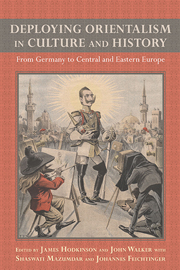Book contents
- Frontmatter
- Contents
- Preface
- Introduction
- 1 (Re)translating the West: Humboldt, Habermas, and Intercultural Dialogue
- 2 Friedrich Schlegel's Writings on India: Reimagining Germany as Europe's True Oriental Self
- 3 Germany's Local Orientalisms
- 4 Tales from the Oriental Borderlands: On the Making and Uses of Colonial Algiers in Germanophone Travel Writing from the Maghreb around 1840
- 5 The Jew, the Turk, and the Indian: Figurations of the Oriental in the German-Speaking World
- 6 M. C. Sprengel's Writings on India: A Disenchanted and Forgotten Orientalism of the Late Eighteenth Century
- 7 Occident and Orient in Narratives of Exile: The Case of Willy Haas's Indian Exile Writings
- 8 Distant Neighbors: Uses of Orientalism in the Late Nineteenth-Century Austro-Hungarian Empire
- 9 Modes of Orientalism in Hungarian Letters and Learning of the Nineteenth and Twentieth Centuries
- 10 Where the Orient Ends? Orientalism and Its Function for Imperial Rule in the Russian Empire
- 11 Noncolonial Orientalism? Czech Travel Writing on Africa and Asia around 1918
- 12 Oriental Sexuality and Its Uses in Nineteenth-Century Travelogues
- Notes on the Contributors
- Index
6 - M. C. Sprengel's Writings on India: A Disenchanted and Forgotten Orientalism of the Late Eighteenth Century
Published online by Cambridge University Press: 05 December 2013
- Frontmatter
- Contents
- Preface
- Introduction
- 1 (Re)translating the West: Humboldt, Habermas, and Intercultural Dialogue
- 2 Friedrich Schlegel's Writings on India: Reimagining Germany as Europe's True Oriental Self
- 3 Germany's Local Orientalisms
- 4 Tales from the Oriental Borderlands: On the Making and Uses of Colonial Algiers in Germanophone Travel Writing from the Maghreb around 1840
- 5 The Jew, the Turk, and the Indian: Figurations of the Oriental in the German-Speaking World
- 6 M. C. Sprengel's Writings on India: A Disenchanted and Forgotten Orientalism of the Late Eighteenth Century
- 7 Occident and Orient in Narratives of Exile: The Case of Willy Haas's Indian Exile Writings
- 8 Distant Neighbors: Uses of Orientalism in the Late Nineteenth-Century Austro-Hungarian Empire
- 9 Modes of Orientalism in Hungarian Letters and Learning of the Nineteenth and Twentieth Centuries
- 10 Where the Orient Ends? Orientalism and Its Function for Imperial Rule in the Russian Empire
- 11 Noncolonial Orientalism? Czech Travel Writing on Africa and Asia around 1918
- 12 Oriental Sexuality and Its Uses in Nineteenth-Century Travelogues
- Notes on the Contributors
- Index
Summary
In 1786, a professor at the University of Halle, Matthias Christian Sprengel, published a history of what was, at the time, the largest and most powerful Indian kingdom, about which few of his German readers had probably ever heard. Die Geschichte der Maratten bis auf den lezten Frieden mit England den 17. Mai 1782 contained nearly 250 pages of sober, statistic-filled narrative that Sprengel had stitched together from dozens of European sources. With this book, the deskbound German surprisingly became the first European to write a comprehensive history of the Maratha Empire, despite the advantages his colonial English, French, and Portuguese contemporaries had in obtaining firsthand information about India. Sprengel's history of the Marathas and two other books that he wrote stood out among eighteenth-century European literature on India, as they were published in German rather than English or French. Sprengel's nonpartisan tone and interest in contemporary politics did not fit the pattern of later German orientalist literature that emerged in the nineteenth century either.
Sprengel's work defies common characterizations of orientalist scholarship. His books do not assume a binary opposition of rational West versus irrational India. He says nothing about Aryan superiority, Indo-European racial connections, or linguistic affinities, and he does not indulge in “the fantasy of a uniquely religion-obsessed India.” His writing contains no “romance, exotic beings, haunting memories and landscapes, remarkable experiences,” and he does not perceive the Orient as the subject of artistic fantasies rather than an actual place.
- Type
- Chapter
- Information
- Deploying Orientalism in Culture and HistoryFrom Germany to Central and Eastern Europe, pp. 117 - 134Publisher: Boydell & BrewerPrint publication year: 2013

